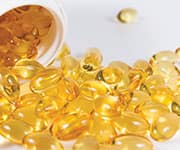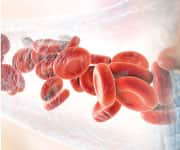Life Extension Magazine®
Coenzyme Q10 (CoQ10) is a nutrient found in every cell in our bodies.
It’s required to make an important cell energy factor called adenosine triphosphate, known as ATP.
Blood levels of CoQ10 drop as we age, and studies have shown that oral intake can provide a wide variety of benefits—especially for heart health.
In this interview, leading cardiologist and anti-aging expert, Dr. Joel Kahn tells Life Extension how CoQ10 can help prevent heart failure, heart attacks, and other cardiovascular issues.

LE: How did you first come to start treating patients with CoQ10?
Dr. Kahn: Many years ago, I was browsing the National Library of Medicine, searching for ways to treat a special patient’s advanced congestive heart failure. I found article after article on basic and clinical trials indicating that it was possible to boost production of cardiac ATP by using CoQ10. After studying several papers, I began recommending CoQ10 routinely for my patients, particularly those with congestive heart failure.
The response over the past 15 years has been transformative. The majority of patients have experienced better energy, improved breathing, and fewer visits to the hospital. I was so convinced that I transitioned my career from interventional to metabolic cardiology, which focuses on the role of cellular energy transfer in preventing and treating heart disease.
LE: How long has CoQ10 been used in clinical cardiology practice?
Dr. Kahn: CoQ10 was first discovered in 1957. Nobel Prize-winning chemist Peter Mitchell revolutionized the science behind CoQ10 in the 1960s, when he showed that it plays an integral role in carrying energy to cells. CoQ10 was introduced into clinical therapy in 1974 in Japan. Many clinical trials showed that oral administration to patients was effective for mild congestive heart failure symptoms such as edema, lung congestion, and swollen liver. On the basis of these clinical findings, CoQ10 was classified in the group of heart disease prescription drugs. Today, it is one of the most affordable ways to promote cardiac health and well-being.
LE: Our bodies naturally produce CoQ10. Why do we need additional intake?
Dr. Kahn: By about the age of 40, the production of CoQ10 throughout the body begins to decline. In diseases like congestive heart failure (when the heart doesn’t pump as well as it should), it may fall even further. And in patients treated with statin cholesterol medications, the production of CoQ10 is partially blocked, because the same processes that produce cholesterol also produce CoQ10.

LE: Can you get CoQ10 from dietary sources?
Dr. Kahn: CoQ10 is found in foods such as whole grains, fish, and organ meats like liver, heart, and kidney. Other than the whole grains and fish, these organ-meat foods are bad for cardiac health, making this path ill-advised. Additionally, the amount available in foods is not sufficient for therapeutic benefits. Directly taking oral CoQ10 boosts blood and tissue levels.
LE: How does CoQ10 benefit those with heart failure or other cardiac problems?
Dr. Kahn: A scientific presentation reported on 420 patients with congestive heart failure who received either 100 mg of CoQ10 or a placebo three times a day. After two years, 26% of the patients on placebo had a cardiac event, but only 15% of those on CoQ10 had one. Even more impressive, 18% of patients in the placebo group died versus 10% in the CoQ10 group. And a significant improvement in the class of heart failure was measured.1
Overall, CoQ10 was found to be safe, to improve symptoms, and to reduce major adverse cardiovascular events. A meta-analysis of studies on congestive heart failure also demonstrated increased exercise capacity and reduced mortality with CoQ10 intake.2
LE: High blood pressure can lead to heart failure, heart attacks, strokes, and more. Should people with high blood pressure be taking CoQ10?
Dr. Kahn: My general protocol for all patients seen at my preventive heart clinic is to include CoQ10 in their program, especially if they are on a statin cholesterol medication. The role of CoQ10 in reducing blood pressure has been studied, and it has been found help lower systolic blood pressure.

LE: There has been a great deal of research on the connection between oral health and heart health. Can CoQ10 play a role here as well?
Dr. Kahn: Inflammation of the gums, or periodontal disease, may trigger inflammation that affects the whole body, including blood vessels and the heart.
CoQ10 can be deficient in gum disease and boosting levels in the gums by taking oral CoQ10 or applying CoQ10 topically is an approach that studies show leads to faster healing.
In view of the very strong connection between optimal oral health and optimal cardiovascular health, using CoQ10 for oral health is another way to support healthy vascular systems.
LE: Are there other nutrients people should take with CoQ10 for prevention of heart disease?
Dr. Kahn: In addition to CoQ10, the mineral selenium is essential for optimal antioxidant defenses. A deficiency in antioxidative capacity can lead to the development of various illnesses, atherosclerosis in particular, (when plaque builds up in artery walls, restricting blood flow), and heart failure.
The combination of selenium and CoQ10 could lead to a more “fuel-efficient” body, better equipped to carry out functions with less damage. This may be especially important for the protection of the heart and optimizing cardiovascular function.
LE: Can you talk about any studies that have been done on the CoQ10-selenium combination?
Dr. Kahn: Researchers in Sweden designed a randomized, double-blind, placebo-controlled trial among healthy citizens with an average age of 78. They enrolled 443 participants who were given either a placebo or a combined 200 mcg of selenium and 200 mg of CoQ10 daily for four years.3
At the five-year follow-up, a significant reduction of cardiovascular mortality was found in the treatment group compared to the placebo group (5.9% mortality in CoQ10-selenium treated patients vs. 12.6% mortality in placebo-treated patients). A marker of cardiac dysfunction was also significantly lower in the CoQ10-treatment group. And, using echocardiography, better cardiac function was found in the treated group compared to the placebo group.
At the 10-year follow up, those who had received the CoQ10-selenium combination still had a reduction in cardiovascular mortality. The protective action was not confined to the intervention period but persisted during the follow-up periods. Reduced all-cause mortality was also observed during this time.
Even after 12 years, a significant reduction in cardiovascular mortality persisted, with a rate of 28% in the treatment group and 45% in the placebo group. In the study subjects with ischemic heart disease, diabetes, hypertension, and impaired functional capacity, there was a significantly reduced cardiovascular mortality risk. The decline in quality of life was also less in those treated with selenium and CoQ10.
Overall, the use of a combination of selenium and CoQ10 was shown to have a remarkable ability to safely improve cardiovascular survival and, to some extent, all-cause mortality.

LE: Do you recommend that patients who are taking CoQ10 also take selenium for heart health?
Dr. Kahn: I do, for optimal antioxidant function. There are some multivitamins and antioxidant blends that include selenium, with the usual amount being 200 mcg daily. If patients are receiving that dose, no additional selenium is advised.
If they are not already taking any selenium, I like a complex combining three different forms of selenium, Se-Methyl L-Selenocysteine, L-Selenomethionine, and sodium selenite, providing 200 mcg overall, often combined with a small amount of vitamin E.
LE: Aside from heart health, what other benefits have you come across for CoQ10?
Dr. Kahn: Studies have suggested a benefit for the treatment of migraine headaches. In a recent meta-analysis of randomized clinical trials, daily CoQ10 significantly reduced the frequency of migraine attacks.4 The addition of other nutrients, like curcumin, to CoQ10 for migraines has been reported to reduce not only the frequency but also the severity and duration of headaches.
LE: As a specialist in metabolic cardiology, have you found that CoQ10 plays a role in metabolic health?
Dr. Kahn: Metabolic syndrome and inflammation may be the underlying drivers of many diseases like diabetes and heart disease. In a recent meta-analysis, CoQ10 intake in individuals with metabolic syndrome led to changes in biomarkers associated with benefit for overall metabolic health.5 Moreover, CoQ10 significantly lowered inflammation markers in individuals with metabolic syndrome compared to those on a placebo.
Such benefits with CoQ10 were related, in part, to the accompanying improvement in glucose control and liver function. The overall findings suggest that optimal regulation of inflammation is crucial for the beneficial effects of CoQ10 in improving metabolic health.
LE: How important a role does CoQ10 play in your medical practice overall?
Dr. Kahn: For the past 40 years, the data to support the use of CoQ10 have been strong and growing. The role of oral CoQ10 intake for a variety of biological functions, none more important or supported than cardiovascular health and longevity, is obvious. Fortunately, intake of CoQ10, even at doses higher than those used in heart trials, was found to be well-tolerated and safe. I will continue to advise all my clinic patients to optimize their health with the daily use of CoQ10.
If you have any questions on the scientific content of this article, please call a Life Extension® Wellness Specialist at 1-866-864-3027.
Joel Kahn, MD, is the founder of the Kahn Center for Cardiac Longevity in Bingham Farms, Michigan.
References
- Mortensen SA, Rosenfeldt F, Kumar A, et al. The effect of coenzyme Q10 on morbidity and mortality in chronic heart failure: results from Q-SYMBIO: a randomized double-blind trial. JACC Heart Fail. 2014 Dec;2(6):641-9.
- Rosenfeldt F, Hilton D, Pepe S, et al. Systematic review of effect of coenzyme Q10 in physical exercise, hypertension and heart failure. Biofactors. 2003;18(1-4): 91-100.
- Alehagen U, Aaseth J, Alexander J, et al. Still reduced cardiovascular mortality 12 years after supplementation with selenium and coenzyme Q10 for four years: A validation of previous 10-year follow-up results of a prospective randomized double-blind placebo-controlled trial in elderly. PLoS One. 2018;13(4):e0193120.
- Zeng Z, Li Y, Lu S, et al. Efficacy of CoQ10 as supplementation for migraine: A meta-analysis. Acta Neurol Scand. 2019 Mar;139(3):284-93.
- Dludla PV, Orlando P, Silvestri S, et al. Coenzyme Q(10) Supplementation Improves Adipokine Levels and Alleviates Inflammation and Lipid Peroxidation in Conditions of Metabolic Syndrome: A Meta-Analysis of Randomized Controlled Trials. Int J Mol Sci. 2020 May 4;21(9).

